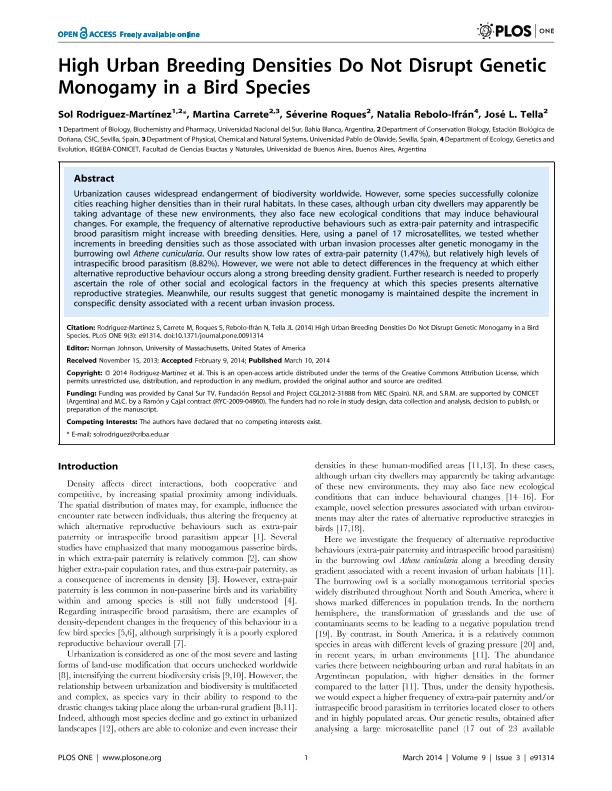Artículo
High Urban Breeding Densities Do Not Disrupt Genetic Monogamy in a Bird Species
Fecha de publicación:
03/2014
Editorial:
Public Library of Science
Revista:
Plos One
ISSN:
1932-6203
Idioma:
Inglés
Tipo de recurso:
Artículo publicado
Clasificación temática:
Resumen
Urbanization causes widespread endangerment of biodiversity worldwide. However, some species successfully colonize cities reaching higher densities than in their rural habitats. In these cases, although urban city dwellers may apparently be taking advantage of these new environments, they also face new ecological conditions that may induce behavioural changes. For example, the frequency of alternative reproductive behaviours such as extra-pair paternity and intraspecific brood parasitism might increase with breeding densities. Here, using a panel of 17 microsatellites, we tested whether increments in breeding densities such as those associated with urban invasion processes alter genetic monogamy in the burrowing owl Athene cunicularia. Our results show low rates of extra-pair paternity (1.47%), but relatively high levels of intraspecific brood parasitism (8.82%). However, we were not able to detect differences in the frequency at which either alternative reproductive behaviour occurs along a strong breeding density gradient. Further research is needed to properly ascertain the role of other social and ecological factors in the frequency at which this species presents alternative reproductive strategies. Meanwhile, our results suggest that genetic monogamy is maintained despite the increment in conspecific density associated with a recent urban invasion process.
Palabras clave:
Urban
,
Breeding Density
,
Monogamy
,
Burrowing Owl
Archivos asociados
Licencia
Identificadores
Colecciones
Articulos(CCT - BAHIA BLANCA)
Articulos de CTRO.CIENTIFICO TECNOL.CONICET - BAHIA BLANCA
Articulos de CTRO.CIENTIFICO TECNOL.CONICET - BAHIA BLANCA
Articulos(IEGEBA)
Articulos de INSTITUTO DE ECOLOGIA, GENETICA Y EVOLUCION DE BS. AS
Articulos de INSTITUTO DE ECOLOGIA, GENETICA Y EVOLUCION DE BS. AS
Articulos(OCA CIUDAD UNIVERSITARIA)
Articulos de OFICINA DE COORDINACION ADMINISTRATIVA CIUDAD UNIVERSITARIA
Articulos de OFICINA DE COORDINACION ADMINISTRATIVA CIUDAD UNIVERSITARIA
Citación
Rodríguez, María Sol; Carrete, Martina; Roques, Séverine ; Rebolo, Natalia; Tella, José L.; High Urban Breeding Densities Do Not Disrupt Genetic Monogamy in a Bird Species; Public Library of Science; Plos One; 9; 3; 3-2014; 1-8; e91314
Compartir
Altmétricas




